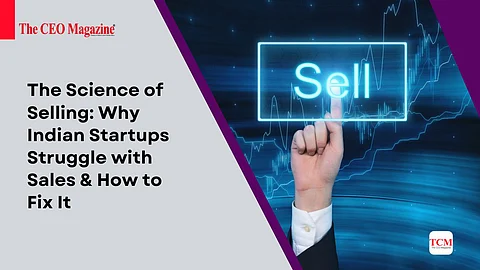
- News
- Women
- Magazine
- IndustryIndustry
- InsightsInsights
- Success Stories
- PublishPublish
- ContactContact
- Media KitMedia Kit

Why Indian Startups Struggle
Let me be brutally honest with you.
Sales is not a skill Indian startups have mastered yet — and it’s costing us.
We have brilliant coders, visionary founders, and global ambitions. But when it comes to building a repeatable, scalable, and predictable sales engine, most founders freeze.
If you’ve ever thought:
“Our product is great, but customers just don’t get it.”
“We’ll hire a sales guy after funding.”
“Sales is sleazy. Let’s focus on product-led growth.”
Then this article is for you.
I’ve worked with dozens of Indian startups — SaaS, D2C, B2B, even Web3 — and one thing is clear: we build, but we don’t sell well.
Let me show you why that happens and how to fix it using the science of selling.
Selling is not art. It’s not luck. It’s not hustle.
It’s a structured process grounded in psychology, human behavior, storytelling, and data.
“People don’t buy products. They buy better versions of themselves.” — Donald Miller
The science of selling involves:
Understanding buyer psychology
Building trust and credibility
Mapping a clear sales journey
Leveraging tools, data, and tech
Once you learn it, you realize selling is not about pushing — it’s about solving.
Let’s break it down. These are the most common sales roadblocks I’ve seen across Indian startups:
Many Indian founders, especially those from technical backgrounds, look down on sales.
“If our product is good, it will sell itself.”
That’s not how business works.
A good product needs a great narrative. A great narrative needs a structured funnel.
You can’t outsource belief.
There’s no defined process — only improvisation.
No CRM. No objection handling docs. No structured follow-ups.
Imagine this: You spend ₹30L on building an MVP but don’t even have a 3-slide sales deck.
Crazy, right? But it happens. A lot.
Startups keep polishing features instead of solving what the customer actually cares about.
“The customer doesn’t care how clever your algorithm is. They want to know if it makes their life easier.”
Great sales starts with deep customer empathy, not a flashy UI.
Hiring a fresher and calling them a “BD Manager” is not a sales strategy.
Sales is a skill, and reps need training, scripts, tools, and mentorship.
Culturally, we avoid confrontation. Cold calls scare us. Follow-ups feel awkward.
But here’s the truth — fortune favors the follow-up.
In the early stage, no one can sell better than the founder.
You understand the problem. You know the vision. You build the trust.
“Sales is the ultimate founder-market fit test.” — Naval Ravikant
Action Plan:
Talk to 100 prospects before hiring a sales team.
Record every call, every objection, every close.
Use these insights to build your first sales script.
Every startup needs a repeatable sales process.
Not a 100-slide manual — just a Google Doc with clear answers.
Your Sales Playbook Should Include:
Ideal Customer Profile (ICP)
Cold email and call scripts
Objection handling matrix
Demo checklist
Deal stages (mapped to CRM)
Follow-up templates
Real example:
At one SaaS startup I mentored, just building a 5-stage pipeline in HubSpot increased conversion by 27% in 60 days.
Your sales reps are not magicians. They’re students of human behavior.
Without regular coaching, they’ll burn out or guess their way through calls.
What works:
Weekly role-play sessions
Call recordings & feedback
Win/loss reviews
Real-time Slack support for objections
“Amateurs practice until they get it right. Professionals practice until they can’t get it wrong.”
You don’t need a fancy 30-page deck.
But you do need trust-building assets that tell a story.
Must-Have Collateral:
1-pager company overview
Slide deck (problem, solution, case studies)
Product demo video (2-3 mins)
Case studies with ROI
FAQ & pricing sheet
Pro tip: Convert your pitch into a 90-second story with a clear CTA.
The right stack helps you scale. At minimum, you need:
CRM (HubSpot, Zoho, Pipedrive)
Email automation (Lemlist, Apollo.io)
Call tracking & recording (Aircall, JustCall)
LinkedIn intelligence (PhantomBuster, Waalaxy)
Bonus Tip:
Use AI tools like ChatGPT to refine pitches, generate cold emails, and simulate objections.
What gets measured gets improved.
Don’t just track “meetings booked” — track the full funnel.
Key Sales KPIs:
Lead-to-demo ratio
Demo-to-close ratio
Average deal size
Sales cycle duration
Win/loss reasons
Visualize this data weekly. It will tell you where the bottlenecks are.
Let’s take an example.
An Indian D2C wellness startup had a great product but plateauing revenue. Their funnel was broken.
Here’s what we changed:
Implemented a 3-stage CRM pipeline
Rewrote all sales scripts with benefits over features
Used WhatsApp automation for follow-ups
Added influencer testimonials in the pitch
Result?
Sales conversions jumped from 8% to 24% in 3 months.
Sales is not magic. It’s math and mindset.
Do I have a sales strategy, or just sales goals?
Are my reps solving or selling?
Is my sales story about me or about the customer?
If you feel even 20% unclear answering those, you have work to do.
And that’s a good thing — awareness is step one.
You can raise funding, go viral, win awards — but if you can’t close deals, none of it matters.
The science of selling isn’t about pressure. It’s about persuasion. It’s not about tactics. It’s about trust.
And guess what? You can learn it, teach it, and scale it.
You don’t need to become a slick salesperson.
You need to become a problem solver with a structured process.
So, if you’re building in India, building for the world — make sales your second product.
Because the best tech won’t win. The best story and the best sales system will.
If this article made you rethink your approach to sales, don’t keep it to yourself.
Share it with your co-founder, growth lead, or sales head.
Let’s stop struggling with sales — and start mastering it.
Follow us on Google News
